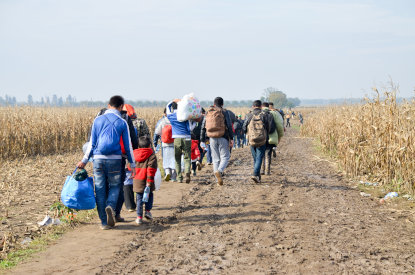Asylum seekers and refugees seek protection because they fear persecution, or because they have experienced violence or human rights violations.
In 2017, INTERPOL’s General Assembly adopted a resolution to ensure that criminals and terrorists are not allowed to abuse refugee or asylum seeker status.
The impetus for the resolution
INTERPOL’s resolution (Resolution No. 9) recognises several United Nations Security Council (UNSC) Resolutions which called upon all States to take appropriate measures to ensure that refugee status is not abused by the perpetrators, organisers or facilitators of terrorist acts.
UNSC Resolution 2178 (2014) specifically encouraged INTERPOL to intensify efforts with respect to the foreign terrorist fighter threat.
Data processing and refugee rights
Resolution No. 9 relates to the processing of data concerning individuals who have been granted refugee or asylum seeker status.
While a key aim is to enhance international police cooperation and stop criminals and terrorists from seeking a safe haven, INTERPOL also endeavours to protect the rights of refugees. This involves the deletion of data concerning an individual (in the form of any Notice or Diffusion) once refugee status is confirmed.
The process of data deletion
Member countries are encouraged to:
- Check INTERPOL’s databases to perform criminal background checks.
- Use INTERPOL’s Information System to exchange information.
- Provide INTERPOL with confirmation that an individual has been granted refugee status and of the outcome of an asylum application review.
- Inform INTERPOL if a decision is made to deny refugee status based on an individual’s criminal background.
INTERPOL is not involved in assessing asylum applications or determining whether a person should be granted refugee status.
Once someone has been granted refugee status by a country, INTERPOL will delete any Notice or Diffusion for this individual from the country where he or she fears persecution.
If an asylum request has been denied, the data may be maintained.
If a refugee status previously granted has been revoked, the data may be restored.
Key takeaways
INTERPOL has adopted a resolution to prevent criminals and terrorists from abusing refugee protection regimes, and an asylum seeker with a criminal background may be denied refugee status. While member countries are encouraged to perform thorough background checks, care also needs to be taken in upholding the rights of legitimate asylum seekers and refugees. Once refugee status is granted, INTERPOL will delete any relevant Notices or Diffusions from the country where the individual fears persecution.



